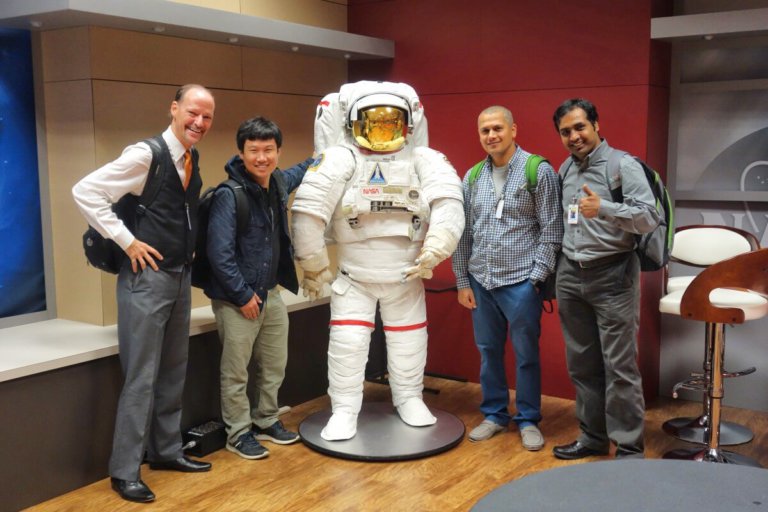
An engineering degree prepares graduate students for a diverse set of careers – and that includes becoming a successful entrepreneur.
One such graduate electrical engineer is Dallas-based CEO Arun Gupta.
While pursuing his PhD in Electrical and Electronics Engineering at the University of Texas at Dallas (UTD), Arun began brainstorming ideas for a renewable energy business.
Seven years on, Arun runs Skyven Technologies, a company that uses solar heating techniques to reduce fossil fuel consumption in agriculture and other industries.
It took home first prize and $US1 million in the 2017 76West Clean Energy Competition, which is run by the New York State Energy Research and Development Authority (NYSERDA).
Arun remains connected with UT Dallas until today, especially through the campus-based entrepreneurship program Blackstone LaunchPad which supports and mentors students, staff and alumni.
“Three or four years ago, the startup assistance wasn’t really available. And now, between the Venture Development Center, the Institute for Innovation and Entrepreneurship and LaunchPad, the University has provided a lot of opportunities and resources to their alumni and students.”
Forward-thinking universities like UT Dallas and electrical engineering graduates like Arun are what the world needs more of.
Inspired? Here are four engineering departments in the US where you can follow in their footsteps.
DEPARTMENT OF ELECTRICAL AND COMPUTER ENGINEERING – UNIVERSITY OF TEXAS AT DALLAS (UT Dallas)
Starting a renewable energy company. Landing a job at a top-level company. Pursuing advanced research. As UT Dallas alumni have shown, you’re never short of options with an engineering degree from The University of Texas at Dallas (UT Dallas).
UT Dallas’s Department of Electrical and Computer Engineering (ECE) offers various Master’s and PhD programmes in computer engineering and electrical engineering.

Source: UT Dallas
An MSc in Electrical Engineering, offers five concentration areas students can choose from: Circuits, Computing Systems, Devices, Power Electronics and Energy Systems, and Signals and Systems.
The MSc in Computer Engineering, takes the best of Electrical Engineering and Computer Science. The MSCE has two concentration areas for students including an Embedded Systems concentration.
Industry-approved and with an extraordinary internship scheme, these programmes are priming graduate electrical and computer engineers to join the workforce or start their own businesses successfully.
Coupled with a talented student body and connections to the hundreds of powerhouse corporations in the Dallas-Fort Worth area, a graduate degree from this university is your springboard to an exciting engineering career ahead.
SCHOOL OF ELECTRICAL ENGINEERING AND COMPUTER SCIENCE – OREGON STATE UNIVERSITY
At the Oregon State School of Electrical Engineering and Computer Science, research efforts do not go unnoticed.
Studying here means conducting research and coming up with the creative solutions to enable people to live safer, smarter, more productive lives.

Source: Shutterstock
Electrical and Computer Engineering Graduate student Phylicia Cicilio is one such student doing this.
Using what she learned with an off-grid energy start up, Phylicia had the opportunity to work with renewable energy and research into improving energy access for remote communities.
“Phylicia was enthusiastic to take on the challenge of developing this extension, called uGridNET, from scratch,” said founder and CEO of OnePower Matt Orosz.
Oregon State University has one of the largest graduate programmes within the university. Its internationally-recognised research programmes are in the areas such as Integrated Electronics, Computer Graphics and Visualization, Energy Systems, Software Engineering and Human Computer Interaction.
DEPARTMENT OF ELECTRICAL ENGINEERING – COLORADO SCHOOL OF MINES
One of the best things about studying at the Colorado School of Mines is that they take imaginative ideas seriously.
For instance, Assistant Professor of Computer Science at Colorado School of Mines Hao Zhang recently won a National Science Foundation CAREER Award to engineer methods for robot reflection and imagination.
“The long-term vision is to create lifelong collaborative robots that adapt at a near-human level in unstructured and ever-evolving worlds over their lifetimes,” says Zhang.

Source: Colorado School of Mines
And over in the Electrical Engineering Department, there’s always something new happening on campus to engage aspiring electrical engineers and lead them to new experiences.
Just as Electrical Engineering student Paige Graine says, “I think the Electrical Engineering Department at Mines is amazing (…) I am doing things now that I never would have dreamed I would ever be able to do while I was in high school.”
With both undergraduate and graduate programmes to offer, and an array of student activities to trial, studying at the Colorado School of Mines will certainly be an insightful experience.
DEPARTMENT OF ELECTRICAL ENGINEERING – JOHNS HOPKINS UNIVERSITY
Johns Hopkins electrical engineering students and faculty members are always supporting their local community.
Last month, the Department of Electrical and Computer Engineering Graduate Student Association (ECE GSA) celebrated National Engineers Week by spending some time with local middle school students at a nearby school.
By rolling out a wind turbine creation contest with different classes, the Hopkins graduate students hoped to get young students excited about electrical and computer engineering.
“As a doctorate student at such a prestigious university, I personally feel compelled to use my education to teach, protect, and serve underrepresented communities,” says ECE GSA Social President Naresh Nandakumar.

Source: Johns Hopkins University
Alongside its focus on engineering for social good, the Department also understands the industry demands for students with a broad skill set.
To cater to that demand, they have a range of future-focused Master’s programmes to pick from, and a PhD programme that enables students to develop their skills and reputation as a valued member of the research community.
You can explore both of these postgraduate avenues further by clicking here.
*Some of the institutions featured in this article are commercial partners of Study International
Liked this? Then you’ll love…
Electronic & electrical engineering: APAC’s spark of innovation
Global universities offering high-opportunity pathways in electrical engineering







